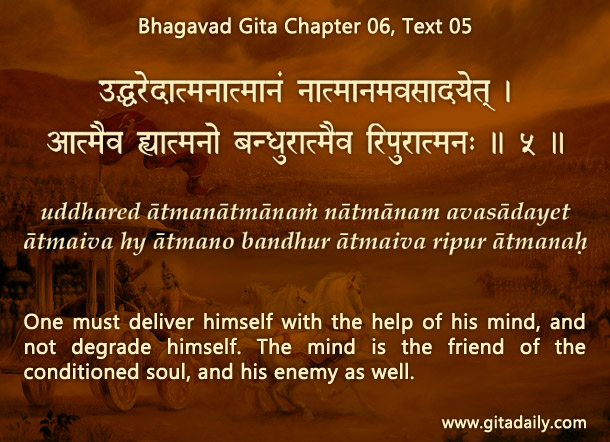How to use the mind’s weapons against the mind
Deal with the mind using the same three weapons that it uses to deal with us: diversion, delay, and disregard.
Managing our mind is one of life’s greatest challenges. When the mind starts becoming uncontrollable, managing it can become like fighting a difficult war. The most effective way to win a war is to turn the weapons of the enemy against the enemy. Not only does this stop the enemy’s attacks on us, but it also provides us with resources to attack the enemy.
In our inner war with our mind, the Bhagavad Gita 6.5 indicates that the very same mind can be our friend and can be used to elevate us. This verse urges us to elevate ourselves with our mind and not degrade ourselves.
Let’s understand the three typical weapons that the mind uses against us: diversion, delay, and disregard.
Whenever we want to do something important, especially something that will fill our life with meaning and make the mind’s meaningless chatter seem vacuous, the mind’s first weapon is to divert our attention to something else. The Bhagavad Gita 6.34 cautions that the mind is restless, with its restlessness being its weapon of choice to distract us from the things that matter.
If the weapon of diversion doesn’t work, and we continue to focus on the important things, the mind deploys the next weapon: delay. It prompts us to do other things before getting to what’s important, making us believe we have plenty of time for those things and can spend the present on tasks that the mind deems urgent, even if they’re not.
Beyond diversion and delay, the mind’s most standard weapon is disregard. It simply doesn’t pay attention to things that are important, and it expects us to stop paying attention to those things as well.
Let’s see how we can use these same weapons against the mind.
We can start with disregard, as this is the mind’s standard weapon and one we can use too. Guided by the wisdom of the Bhagavad Gita, we understand that we are not our mind, and we are not duty-bound to obey it. It’s not our boss, and we aren’t its slaves. We have every right to disregard the mind’s suggestions, especially when they’re not in our best interests. At such times, we have not only the right but also the responsibility to disregard the mind. While the mind may raise a fuss, it will eventually cool down when it sees we aren’t intimidated by it and won’t comply.
If the mind’s ranting becomes too loud or lasts too long, we can use the other two weapons of diversion and delay. We can shift our focus to something that isn’t harmful to us but is interesting for the mind. This is the purpose of recreation, which Bhagavad Gita 6.17 recommends in due moderation. Of course, we must be mindful that after this diversion, we return our focus to what truly matters.
Similarly, we can use delay. Rather than saying a categorical “no” to the mind, we can respond to its demands with a gentle but firm “later” while continuing to focus on what’s important. With time, the mind may lose interest in its infatuations and begin to engage with what truly matters.
The war with the mind is complex and unpredictable. We can never be sure which weapon will work at what time, so we need to be ready and resourceful to try out various approaches.
Ultimately, however, the game-changer in our war with the mind is not using the mind’s weapons against it but bringing in a weapon that the mind doesn’t have: devotion. When we direct our heart and life toward God with a devotional attitude, that disposition gives us divine strength and non-material joy. This not only enables us to overpower the mind but also to disempower it.
How do we disempower the mind? The mind constantly seeks pleasure, and when we become absorbed in Krishna, experiencing the highest pleasure, the mind gradually accepts that its search for pleasure culminates in Krishna and doesn’t need to look elsewhere. In this way, the mind stops acting as our enemy and becomes our friend, assisting us in our devotional journey.
Summary:
- The mind can defeat us by deploying the weapons of diversion, delay, and disregard.
- By having something important to focus on and holding to that focus, we can turn the mind’s weapons against it.
- The ultimate game-changer in the war against the mind is devotion, which enables us to not only overpower but also disempower the mind, transforming it from an enemy to a friend.
Think it over:
- Recollect times when the mind has used each of its three weapons against you.
- Contemplate how you can use each of these weapons against the mind.
- In the war against the mind, which weapon is the ultimate game-changer, and why?
***
06.05 One must deliver himself with the help of his mind, and not degrade himself. The mind is the friend of the conditioned soul, and his enemy as well.


Leave A Comment